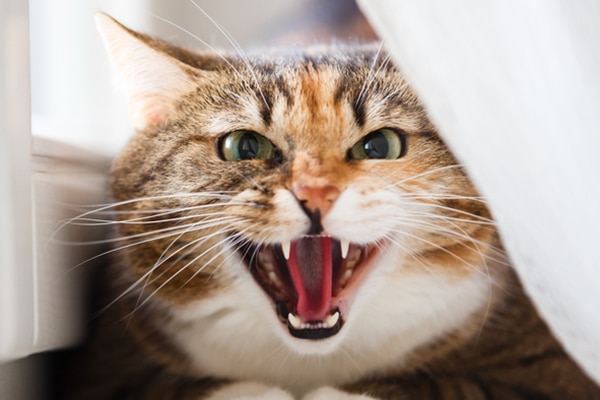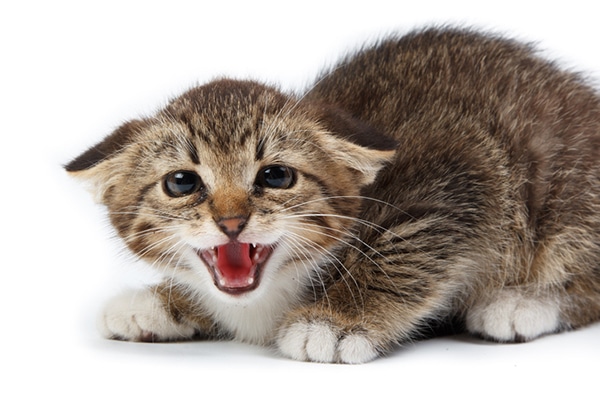Dealing With an Aggressive Cat? 7 Reasons Why Cats Become Aggressive
The post Dealing With an Aggressive Cat? 7 Reasons Why Cats Become Aggressive by JaneA Kelley appeared first on Catster. Copying over entire articles infringes on copyright laws. You may not be aware of it, but all of these articles were assigned, contracted and paid for, so they aren't considered public domain. However, we appreciate that you like the article and would love it if you continued sharing just the first paragraph of an article, then linking out to the rest of the piece on Catster.com.
Even the most experienced cat caretakers can find themselves charged up on adrenalin when having to face a cat in the midst of a fit of aggression. But encountering a hissing, growling, screaming, and possibly even scratching and biting cat can strike terror into the hearts of people who don’t know how to handle an aggressive cat.
Related: Do You Have an Aggressive Cat — or Just a Brat?!
But cats don’t just suddenly go crazy: There are almost always warning signs and there’s almost always a good reason for cat aggression. Here are seven reasons why cats become aggressive and how to handle an aggressive cat.

An aggressive cat might be responding to pain. Photography ©points | Thinkstock.
1. Cats Become Aggressive Because They’re in Pain
Cats who are in pain will respond with hisses and swats when sensitive areas are touched. My cat, Siouxsie, does this if I accidentally put pressure on her sore hips. A hard yank on the tail, for example, can be quite painful. Ignore the warning signs and a scratch and possibly even a bite may follow. This is especially true if the pain is a result of physical abuse such as being kicked or hit.
2. Fear Can Cause Cat Aggression
A terrified cat will respond with body language that’s obvious to an experienced cat caretaker: She will turn sideways and puff up her tail and fur in order to look larger. Her ears will flatten backwards, she will hiss and her pupils will dilate. Attempting to approach a cat in this state is risking an aggressive reaction, not because the cat dislikes you but because she’s in the middle of a panic reaction.
3. Hormones May Cause a Cat to Become Aggressive
A cat who is not spayed or neutered is much more likely to be aggressive. Male cats in particular are biologically wired to fight with other male cats when females in heat are present. If you see two cats fighting, do not physically intervene because you will almost certainly become the target of the cats’ aggression.
4. Cats Can Get Aggressive Due to Frustration
“Redirected aggression” is the term for violent acts carried out by cats because they can’t reach the object of their predatory passion. For example, an indoor cat who sees another cat walking by or marking his territory in “his” turf may get into a highly reactive state. At that point, anyone unfortunate enough to be nearby, whether that’s another cat, a dog or a person, may end up on the receiving end of the cat’s aggression.

An aggressive cat may be responding to stress within your home. Photography ©Ornitolog82 | Thinkstock.
5. Cat Aggression Happens Due to Stress
If a cat lives in a highly stressful environment — for example, a home in which people are fighting or a home with too many cats — it’s quite possible for that cat to be quick to respond aggressively. Like children who live in homes with a lot of verbal and physical violence, or a lot of unspoken anger, cats often act out the dynamics of their human families.
6. An Aggressive Cat Might Be Responding to Trauma
Don’t laugh: Cats can suffer from post-traumatic stress. Their brains are wired similarly to ours, and the effects of chronic anxiety from past human violence or struggling to survive on the streets can lead cats to become aggressive. In order to resolve this issue, a short course of anti-anxiety medication (prescribed by a vet, of course; don’t give your cat your antidepressants, please), homeopathic remedies or flower essences can help make a cat less reactive to triggers.
7. Chemical Imbalances Can Cause Cat Aggression
This is by far the rarest reason for cats to become aggressive. But like humans, some cats simply have biochemical imbalances that affect behavior. For these cats, antidepressants or anti-anxiety medications can be a lifesaver.
The bottom line on handling an aggressive cat
No matter what the cause of the aggression, there are almost always warning signs. If you understand feline body language, you’ll be able to see that your furry friend is getting wound up before the situation escalates to a crisis point. If you have a highly reactive cat and you want to help him or her, be aware that it will take time and patience — but take it from a person who has rehabilitated traumatized cats: The reward is so worth the effort!
Tell us: How about you? Have you had an aggressive cat? Were you able to help your kitty feel better and become less reactive? What did you do to help her? Have you ever been unable to help an aggressive cat? Share your thoughts in the comments.
Featured photograph: Photography by elwynn / Shutterstock.
Read Next: Feline Non-Recognition Aggression: 4 Tips for Reintroducing Your Cats After One Returns From the Vet
The post Dealing With an Aggressive Cat? 7 Reasons Why Cats Become Aggressive by JaneA Kelley appeared first on Catster. Copying over entire articles infringes on copyright laws. You may not be aware of it, but all of these articles were assigned, contracted and paid for, so they aren't considered public domain. However, we appreciate that you like the article and would love it if you continued sharing just the first paragraph of an article, then linking out to the rest of the piece on Catster.com.




Post a Comment